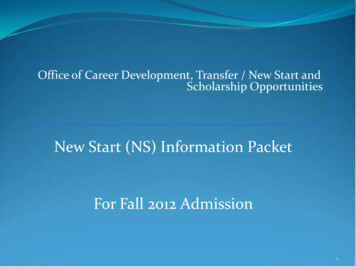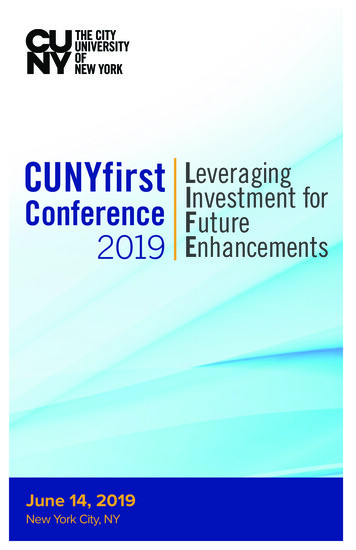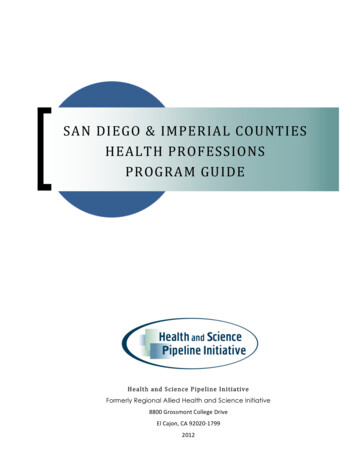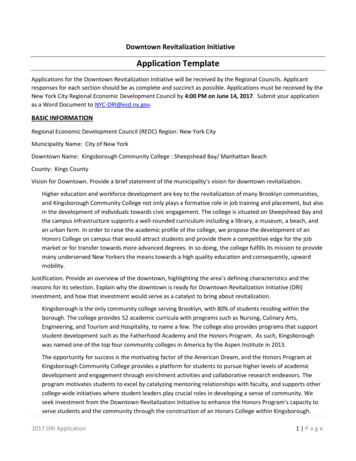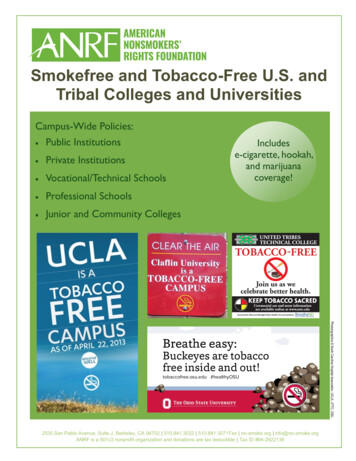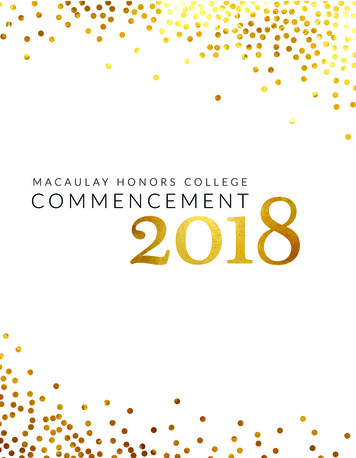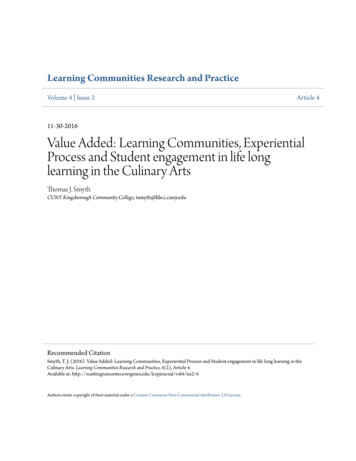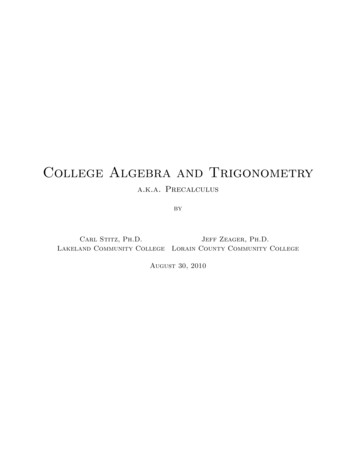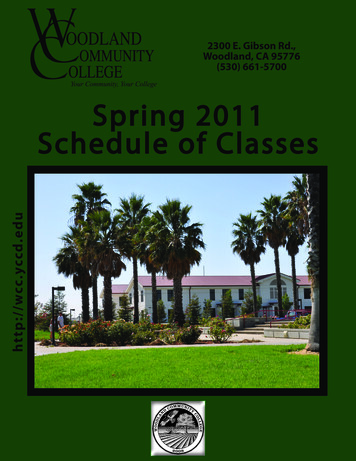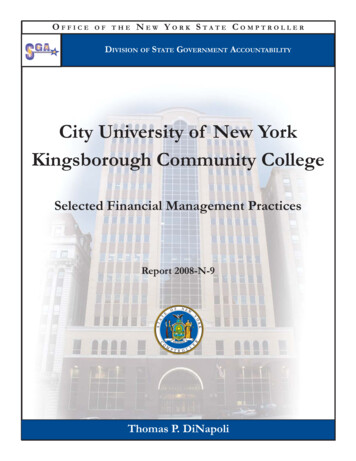
Transcription
OFFICEOF THENEW YORK STATE COMPTROLLERDIVISION OF STATE GOVERNMENT ACCOUNTABILITYCity University of New YorkKingsborough Community CollegeSelected Financial Management PracticesReport 2008-N-9Thomas P. DiNapoli
Table of ContentsPageAuthority Letter .5Executive Summary .7Introduction .9Background .9Audit Scope and Methodology .9Authority.10Reporting Requirements .10Contributors to the Report .10Audit Findings and Recommendations .11Procurement .11Recommendations .12Tuition Waivers .12Recommendation.13Payroll .13Recommendations .14Agency Comments .15State Comptroller’s Comments .21Division of State Government Accountability3
Authority LetterState of New YorkOffice of the State ComptrollerDivision of State Government AccountabilitySeptember 10, 2009Dr. Regina S. Peruggi, PresidentKingsborough Community College2001 Oriental BoulevardBrooklyn, NY 11235-2398Dear Dr. Peruggi:The Office of the State Comptroller is committed to helping State agencies, public authoritiesand local government agencies manage government resources efficiently and effectively and, byso doing, providing accountability for tax dollars spent to support government operations. TheComptroller oversees the fiscal affairs of State agencies, public authorities and local governmentagencies, as well as their compliance with relevant statutes and their observance of good businesspractices. This fiscal oversight is accomplished, in part, through our audits, which identifyopportunities for improving operations. Audits can also identify strategies for reducing costs andstrengthening controls that are intended to safeguard assets.Following is a report of our audit of CUNY Kingsborough Community College’s Selected FinancialManagement Practices. This audit was performed pursuant to the State Comptroller’s authorityunder Article V, Section 1, of the State Constitution and Article III, Section 33 of the GeneralMunicipal Law.This audit’s results and recommendations are resources for you to use in effectively managingyour operations and in meeting the expectations of taxpayers. If you have any questions about thisreport, please feel free to contact us.Respectfully submitted,Office of the State ComptrollerDivision of State Government AccountabilityDivision of State Government Accountability5
Executive SummaryState of New YorkOffice of the State ComptrollerEXECUTIVE SUMMARYAudit ObjectiveOur objective was to determine whether Kingsborough Community College complied withfinancial operation procedures for procurements, tuition waivers and payroll.Audit Results – SummaryWe found that Kingsborough Community College (KCC) did not always follow proceduralguidance provided by CUNY and needs to strengthen controls over procurement, tuition waiversand payroll.CUNY’s Purchasing Policy Manual (Manual) requires solicitations of bids for all purchases withcosts in excess of 5,000. We judgmentally selected payments to 10 vendors that should haveevidenced such bidding according to the Manual. These payments totaled 136,730 during fiscalyear 2007-08. We found noncompliance with 3 of the 10 procurements we reviewed, totaling 44,177.CUNY’s Tuition and Fee Manual allows individuals who meet New York City/State residencyrequirements, and who are 60 years of age and older, to enroll in undergraduate courses andhave their tuition fees waived. We found that KCC did not maintain the required proof of agedocumentation or New York State residency for six students who received 1,193 in tuition waivers.To determine whether KCC complied with the City of New York Payroll Procedures Directive13, which requires that undistributed checks be controlled and recorded on a log, we reviewed theundistributed paychecks located in the Bursar’s Office. We found that none of the 69 undistributedpaychecks were logged in, as required.We determined that overtime is not approved in advance as required by KCC’s procedures. Wereviewed a sample of overtime records for 30 employees and found that there were no writtenpre-approvals or pre-authorizations on file. Instead, we found that written approval occurred onlyafter the overtime had already been worked. These 30 employees earned 341,154 in overtimepayments for the two years ended June 30, 2008.Division of State Government Accountability7
Our report contains seven recommendations to improve controls over KCC’s financialmanagement practices. In their response to our draft report, KCC officials generally agreed withour recommendations. They indicated the specific actions that they have taken or will be takingto implement them.This report, dated September 10, 2009, is available on our web site at:http://www.osc.state.ny.usAdd or update your mailing list address by contacting us at: (518) 474-3271 orOffice of the State ComptrollerDivision of State Government Accountability110 State Street, 11th FloorAlbany, NY 122368Office of the New York State Comptroller
IntroductionIntroductionBackgroundThe City University of New York (CUNY) is the largest urban universitycollege system in the United States. It consists of eleven senior colleges, sixcommunity colleges, and several other specialized and professional schools.CUNY serves more than 231,000 degree-credit students and 230,000 adultcontinuing and professional education students. Kingsborough CommunityCollege (KCC), one of the six community colleges, is located on a 70-acrecampus in Manhattan Beach, Brooklyn, New York. Founded in 1963, KCCserves approximately 30,000 students per year, offering a wide range ofcredit and non-credit courses in the liberal arts and career education, as wellas a number of specialized programs. In addition, KCC offers a number ofprograms for special populations, including the My Turn program for seniorcitizens. For the school year ended June 30, 2008, KCC had expenses of 74 million with 64 million allocated to payroll and personal service costincluding salaries and wages, retirement contributions and other employeebenefits and payroll taxes.Internal control is a major part of managing an organization. It comprisesthe plans, methods, and procedures used to meet missions, goals, andobjectives and, in doing so, support performance-based management.Internal control also serves as the first line of defense in safeguarding assetsand preventing and detecting errors and fraud. In short, internal control,which is synonymous with management control, helps government programmanagers achieve desired results through effective stewardship of publicresources. KCC’s internal control over its financial operations is found,among other places, in CUNY’s Purchasing Policy Manual and CUNY’sTuition and Fee Manual.AuditScope andMethodologyWe conducted our audit in accordance with generally accepted governmentauditing standards. We audited selected financial management practices atKCC for the period July 1, 2006 through January 20, 2009.To accomplish our audit objective, we interviewed KCC officials andreviewed the school’s records related to procurement, tuition waivers andpayroll. We reviewed applicable laws and regulations as well as CUNYand KCC policies and procedures. We reviewed a judgmental sample of10 vendors to determine whether goods and services were procured inaccordance with CUNY requirements. We also reviewed samples of 15student and tuition waivers to determine whether they were in compliancewith CUNY’s polices and procedures. Further, we reviewed all undistributedDivision of State Government Accountability9
paychecks and the overtime records for 30 employees to determinecompliance with related policies and procedures.In addition to being the State Auditor, the Comptroller performs certain otherconstitutionally and statutorily mandated duties as the chief fiscal officer ofNew York State. These include operating the State’s accounting system;preparing the State’s financial statements; and approving State contracts,refunds, and other payments. In addition, the Comptroller appoints membersto certain boards, commissions and public authorities, some of whom haveminority voting rights. These duties may be considered managementfunctions for purposes of evaluating organizational independence undergenerally accepted government auditing standards. In our opinion, thesefunctions do not affect our ability to conduct independent audits of programperformance.AuthorityThe audit was performed pursuant to the State Comptroller’s authorityunder Article V, Section 1, of the State Constitution and Article III, Section33 of the General Municipal Law.ReportingRequirementsWe provided a draft copy of this report to KCC officials. We have consideredtheir comments in preparing this audit report. KCC officials generally agreedwith our recommendations, although they disagreed with our conclusionson certain matters. Officials also provided details regarding the actions theyare taking to address our recommendations. A copy of KCC’s response isattached to this report. State Comptroller’s comments to their response isalso attached at the end of this report.Within 90 days of the final release of this report, as required by Section170 of the Executive Law, the Chancellor of the City University of NewYork shall report to the Governor, the State Comptroller, and the leadersof the Legislature and fiscal committees, advising what steps weretaken to implement the recommendations contained herein, and whererecommendations were not implemented, and the reasons therefor.Contributorsto the Report10Major contributors to the report include Kenrick Sifontes, Stephen C.Lynch, Joan Williams, Irena Kovaneva, Hunan Zhang and David Schafer.Office of the New York State Comptroller
Audit Findings and RecommendationsAudit Findings and RecommendationsProcurementCUNY’s Purchasing Policy Manual (Manual) states that the PurchasingDepartment should solicit a minimum of five bids for all purchases thatcost between 5,000 and 20,000. In instances of sole source procurements,Purchasing Department officials are required to document the reasonwhy only one source is available and the total amount to be paid isreasonable. Faculty, staff, and administrators do not have authorization toprocure commodities or services or to enter into contractual relationshipswith vendors or to make any commitments on behalf of KCC, except inextenuating circumstances.To determine whether KCC officials procured goods and services inaccordance with CUNY requirements, we reviewed a judgmental sample of10 procurements pertaining to 10 vendors who were paid between 5,000and 20,000 by KCC during the fiscal year ended June 30, 2008. In total,the 10 vendors were paid 136,730. We found exceptions with three of the10 purchases totaling 44,177, as follows: KCC paid an emergency medical technician vendor 19,500 for training services without soliciting bids from other vendors, as required.Furthermore, a senior level administrative employee negotiated andprocured these services on behalf of KCC. There were no extenuatingcircumstances that would have authorized this employee to perform thisfunction. KCC paid an automatic door service vendor 16,875 for maintenanceservices without soliciting bids from other vendors, as required. KCCofficials advised us that they considered the vendor as a sole sourcebecause the vendor was the authorized distributor located in the area ofthe college. However, we identified several other automatic door servicevendors in the area who should have been invited to bid. We also notedthat there was no documentation to justify the total amount paid wasreasonable. KCC paid a laundry service vendor 7,802 without soliciting bids fromother vendors, as required. The vendor had the previous contract forlaundry services; however, the contract had expired. Instead of soliciting new bids as required, KCC officials awarded the contract to thissame vendor. KCC officials advised us that the vendor committed todelivering the same level of service for the same cost as it provided inthe earlier contract. However, there is no assurance that the price paidwas reasonable.Division of State Government Accountability11
KCC officials advised us that the Purchasing Department will reinforcecorrect procedures to all department end-users at the start of the biddingprocess as well as conduct training sessions for all individuals involved inthe procurement process.Recommendations1. Solicit bids for all purchases of goods and services that cost 5,000 ormore.2. Ensure that only authorized KCC personnel procure goods and services.3.TuitionWaiversEnsure that sole source designations are used in proper circumstances.KCC offers a tuition-free college education program called My Turn(Program). Program participants are permitted to enroll in undergraduatecourses on a space available basis. According to CUNY’s Tuition and FeeManual, program participants must be New York City or New York Stateresidents for at least 12 months prior to enrollment, and be least 60 yearsold on the first day of the semester or session. Acceptable proofs of agedocuments include a Medicaid card, driver’s license, or birth certificate.KCC is required to retain a copy of these records or obtain a signedstatement by a college official attesting that one of the above documents wasexamined and the student satisfied the age requirement. Acceptable proofof residency documents include a copy of a deed, lease, rent registrationor latest income tax return. From fall 2006 to spring 2008, KCC officialsreported that they waived tuition fees totaling 1.1 million for 2,157 MyTurn program students.To determine whether KCC officials ensured that participants met Programrequirements, we reviewed the student files of a judgmental sample of 15My Turn students. These 15 students received a total of 5,153 in tuitionwaivers. Our sample consisted of those students with comparatively highamounts of waived tuition. We found that certain documents were missingfor 6 of the 15 students we reviewed (40 percent). One of the student files didnot contain proof of age documentation; three student files did not containproof of New York State residency documentation; and two student files didnot contain proof of either age or New York State residency documentation.The three files lacking proof of age documentation also did not include asigned statement by a college official attesting that such documentation hadbeen examined and substantiated that each student met the age requirement.When such evidence is missing, KCC lacks assurance that these studentsmet program requirements. Thus, KCC may have inappropriately waived 1,193 in tuition revenue for these six students.KCC officials advised us that they plan to implement procedural changeseffective with the winter 2009 semester. At that time, all applications for12Office of the New York State Comptroller
My Turn waivers will be initialized by My Turn staff, indicating that therequired documents (for both age and residency requirements) have beenreviewed before the application is submitted to the Admissions Office.Further, KCC officials told us that all applications for readmission will alsorequire copies of documents proving age and New York State residency.These applications will be initialized by My Turn staff indicating they arecomplete before they are forwarded to the Office of the Registrar.RecommendationPayroll4.Obtain proof of age and residency documents and maintain them instudent files.Undistributed PaychecksThe City of New York Payroll Procedures (Procedures) Directive 13requires that undistributed checks be controlled to ensure that they are notmisappropriated. The Procedures require that undistributed checks anddirect deposit earning statements must be recorded on a log. Checks andstatements for employees on annual or sick leave who are expected to returnshortly must be returned to the agency payroll office where they must beplaced in a secure facility. In addition, the Procedures require that checksthat cannot be distributed to employees should be refunded to the Officeof Payroll Administration (OPA). KCC officials informed us that it is theirpractice to wait until 60 days before they return checks to OPA; however,this is not a written policy.To determine whether undistributed checks were properly controlled, wereviewed the undistributed paychecks located in the Bursar’s Office onSeptember 9, 2008. We found that none of the undistributed paychecks(69 in total) were recorded on a log, as required. We also noted that none ofthese 69 checks were older than 60 days, thus they were not yet due to bereturned to the OPA, as required. KCC officials advised us that effectivewith the spring 2009 semester, the Payroll Distribution Office will maintaina log of all undistributed paychecks. Employees will be required to sign thelog as evidence of receipt. Officials also advised us that written proceduresare being established for the return of paychecks to the OPA.OvertimeAccording to KCC officials, all overtime should be pre-approved by therespective department supervisor on an Overtime Authorization form.During fiscal years 2006-07 and 2007-08, KCC expended 943,485 and 820,084 in overtime payments to 259 and 279 employees, respectively.Division of State Government Accountability13
To determine whether overtime was properly pre-approved, we revieweda judgmental sample of overtime records for 30 employees. Our sampleconsisted of overtime records for 15 employees from fiscal year 2006-07and 15 employees from fiscal year 2007-08. We selected employee overtimerecords that contained high dollar amounts and represented a variety of worktitles. In total, these overtime records supported 341,154 in payments. Wefound that there were no written pre-approvals for any of the 30 employeeovertime records that we reviewed. Instead, for each of these 30 employees,we found that written approval occurred only after the overtime had alreadybeen worked.KCC officials acknowledged the need to improve record keeping by securingwritten approval prior to the commencement of work. They also advis
continuing and professional education students. Kingsborough Community College (KCC ), one of the six community colleges, is located on a 70-acre campus in Manhattan Beach, Brooklyn, New York. Founded in 1963, KCC serves approxi
